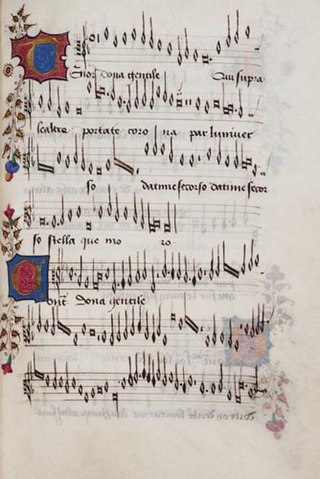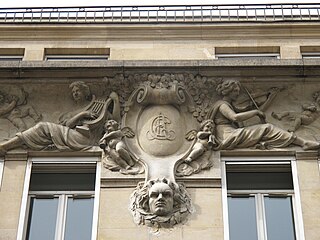SACD, founded as Société des Auteurs et Compositeurs Dramatiques on 7 March 1829, is a French collecting society, undertaking collective rights management for authors. The Society manages, promotes and protects the performance rights of theatrical, audiovisual or photographic works for their creators by collecting royalties and authorising performances. It's also one of the main lobbies against "droit d'auteur" (copyright) changes and to protect the activities of collective rights management societies.
A copyright collective is a non-governmental body created by copyright law or private agreement which licenses copyrighted works on behalf of the authors and engages in collective rights management. Copyright societies track all the events and venues where copyrighted works are used and ensure that the copyright holders listed with the society are remunerated for such usage. The copyright society publishes its own tariff scheme on its websites and collects a nominal administrative fee on every transaction.
A performance rights organisation (PRO), also known as a performing rights society, provides intermediary functions, particularly collection of royalties, between copyright holders and parties who wish to use copyrighted works publicly in locations such as shopping and dining venues. Legal consumer purchase of works, such as buying CDs from a music store, confer private performance rights. PROs usually only collect royalties when use of a work is incidental to an organisation's purpose. Royalties for works essential to an organisation's purpose, such as theaters and radio, are usually negotiated directly with the rights holder. The interest of the organisations varies: many have the sole focus of musical works, while others may also encompass works and authors for audiovisual, drama, literature, or the visual arts.

The Swiss Broadcasting Corporation is the Swiss public broadcasting association, founded in 1931, the holding company of 24 radio and television channels. Headquartered in Bern, the Swiss Broadcasting Corporation is a non-profit organisation, funded mainly through radio and television licence fees (79%) and making the remaining income from advertising and sponsorship.
As there is no dominant national language, the four main languages of French, Italian, German and Romansch form the four branches which make up a literature of Switzerland. The original Swiss Confederation, from its foundation in 1291 up to 1798, gained only a few French-speaking districts in what is now the Canton of Fribourg, and so the German language dominated. During that period the Swiss vernacular literature was in German, although in the 18th century, French became fashionable in Bern and elsewhere. At that time, Geneva and Lausanne were not yet Swiss: Geneva was an ally and Vaud a subject land. The French branch does not really begin to qualify as Swiss writing until after 1815, when the French-speaking regions gained full status as Swiss cantons. The Italian and Romansch-Ladin branches are less prominent.

The Historical Dictionary of Switzerland is an encyclopedia on the history of Switzerland. It aims to present the history of Switzerland in the form of an encyclopaedia, published both on paper and on the internet, in three of the country's national languages: German, French and Italian. When it was completed at the end of 2014, the paper version contained around 36,000 articles divided into thirteen volumes. At the same time, a reduced edition of the dictionary has been published in Romansh under the title Lexicon istoric retic (LIR), and constitutes the first specialist dictionary in the Rhaeto-Romance, Switzerland.

The Gesellschaft für musikalische Aufführungs- und mechanische Vervielfältigungsrechte is a government-mandated collecting society and performance rights organization based in Germany, with administrative offices in Berlin and Munich. GEMA represents the usage rights stemming from authors' rights for the musical works of those composers, lyricists, and publishers who are members in the organization. It is the only such institution in Germany and a member of BIEM and CISAC. Other collecting societies include the (AKM) Society of authors, composers and music publishers in Austria and SUISA in Switzerland.

Music publishing is the business of creating, producing and distributing printed musical scores, parts, and books in various types of music notation, while ensuring that the composer, songwriter and other creators receive credit and royalties or other payment. This article outlines the early history of the industry.

The Society of Authors, Composers and Publishers of Music or SACEM is a French professional association collecting payments of artists’ rights and distributing the rights to the original songwriters, composers, and music publishers. Founded in 1851, it is a non-profit non-trading entity owned and managed by its members according to the business model of a cooperative.
The Federal Inventory of Heritage Sites (ISOS) is part of a 1981 Ordinance of the Swiss Federal Council implementing the Federal Law on the Protection of Nature and Cultural Heritage.

The Italian Society of Authors and Publishers, commonly known by its acronym SIAE, is the Italian copyright collecting agency. Founded in 1882 in the Kingdom of Italy, it is the monopolist intermediary between the authors of musical tracks and consumers, managing the economic aspects and the distribution of money from royalties of Italian-copyrighted music to authors and on their behalf. In the 2000s and 2010s, SIAE was known for the controversial decision to claim payment through the "Private Copy Siae Tax" for every blank CD, DVD, and HDD sold in Italy since 2001. From 2013 to February 2015, the main spokesperson of the SIAE organization was the songwriter Gino Paoli, who was the president of the society. Paoli resigned after he was investigated for tax evasion; Filippo Sugar was then appointed as a president. The current president is Mogol, famous Italian lyricist.
The Composers, Authors and Publishers Association of Canada was a Canadian copyright collective for the right to communicate with the public and publicly perform musical works. CAPAC administered these rights on behalf of its members and those of affiliated international organizations by licensing the use of their music in Canada. Royalties were paid to the music creators after administration costs were deducted to pay for the operation of CAPAC.
Giampaolo Coral was an Italian composer.

The Swiss National Sound Archives are the sound archives of Switzerland, based in Lugano. Its mission is to collect sound recordings related to the history and culture of Switzerland, to make them accessible and to make them available for use. In terms of audio recordings, it thus fulfils a similar function to the Swiss National Library in the field of literature. Since 2016, the National Sound Archives have been an organisational part of the Swiss National Library. The collection has more than 500,000 audio carriers and 20-25,000 audio documents are added each year.

Julien-François Zbinden was a Swiss composer and jazz pianist.
The Sanremo Music Festival 1957, officially the 7th Italian Song Festival, was the seventh annual Sanremo Music Festival, held at the Sanremo Casino in Sanremo between 7 and 9 February 1957. The show was presented by television presenter Nunzio Filogamo, assisted by Marisa Allasio, Fiorella Mari, Nicoletta Orsomando.
The Schweizer Musikzeitung (SMZ) is a monthly music magazine from Brunnen. It is published in German, French and sporadically in Italian and reaches a circulation of 19,484 copies and a reach of 24,000 readers. Editor-in-chief is Katrin Spelinova-Bösch.
Francesco Beretta was an Italian organist, composer and Kapellmeister and a predecessor of Paolo Lorenzani - a pupil of Orazio Benevoli - at the Cappella Giulia of St. Peter.
Schweizer Seilbahninventar was published in 2011 by the Federal Office of Culture. Of about 3000 cableways in Switzerland, the heritage inventory assesses 67 as of national importance and 44 as of regional importance in terms of the Swiss Federal Act on the nature and cultural heritage. It also includes 18 noteworthy more recent systems. Installations are included for their cultural or technological significance. The inventory covers aerial cableways, funiculars and ski lifts. Classifications applied are those of Swiss authorities. It does not cover inclined elevators, mobile lifts and installations part of residential, military or industrial building complexes.








